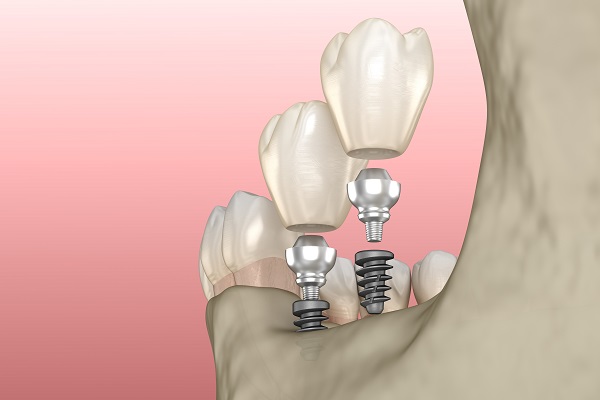When Are Mini Dental Implants Recommended?

Mini dental implants are a miniature form of traditional implants and are also used for replacing lost adult teeth. However, each of these options has their optimal applications and are generally recommended by a dentist following careful oral evaluation. Continue reading to find out when a dentist might recommend mini dental implants.
When mini dental implants are recommended
As the name implies, a mini dental implant has a smaller diameter compared to a traditional implant, which is twice the size. The diameter is only two to three millimeters. Due to the size of regular dental implants, they are sturdier and provide better support for dental restorations than mini implants. However, not every patient can get them. The following are reasons a dentist would suggest getting mini implants:
For replacing smaller teeth
When a small tooth falls out, it is better to replace it with mini implants to avoid subjecting the remaining teeth to undue pressure. This is usually the case for people with small front teeth. Therefore, if the dentist discovers the jaw size is small during the initial examination, they will likely recommend mini dental implants.
For front-row teeth
Front teeth do not handle as much pressure and grinding as the molars do. This means placing mini implants instead of regular ones will be inconsequential to dental functions. The mini implants will serve their purpose over an extended period with minimal risk of failure.
For depleted jawbone
When a tooth is lost, the jawbone in the area starts to deplete gradually. When the bone mass has depleted to the point where it cannot support regular-sized implants but is enough to support mini implants, the dentist will make the recommendation. The dental professional will consider the tooth's position, the purpose it serves, and if a mini dental implant can function adequately as a replacement option. Replacing a lost tooth with implants prevents further bone deterioration and tooth movement.
For denture support
Regular dentures tend to lose their fitting and get loose in the mouth, so implant-supported dentures are the preferred choice for complete teeth loss. The dentist may opt for mini dental implants to hold the dentures in place. The chewing force is minimal and not beyond what the implants can handle. Bone and gum tissue loss is also common with people with severe teeth loss, so mini implants are often the best option to support the dentures.
For those desiring a minimally invasive treatment
Mini implants induce less stress on the jaw and the patient than traditional implants. The restoration process can also be completed in one day. However, the dentist will ensure patients take the necessary precautions because the implants still need to fuse with the jawbone. Therefore, it must not be subjected to excessive pressure or force.
Considering mini dental implants for your missing teeth?
Mini dental implants have specific functions and are often used as a tooth replacement option. If you are missing a tooth, contact our dental office to schedule a consultation appointment.
Request an appointment here: https://newyorkdmd.com or call New York DMD at (917) 284-9680 for an appointment in our New York office.
Recent Posts
If you have a missing tooth you would like to replace, you need to learn more about getting a dental implant. Dental implants can improve your smile. They can also prevent many of the problems associated with missing teeth. Implants are one of the most popular options for replacing teeth. If you are thinking about…
Many individuals are apprehensive about finding a restorative dentist. They want a dentist who can help them restore their smile to look more natural and appealing. This field of dentistry is concerned with repairing damage to the teeth and restoring normal dental functions.The restorative dentist must be ready to listen to their patients about their…
It is not just inconvenient and humiliating to have loose dentures. They may even end up posing a risk to your dental health over time. Unfortunately for denture users, looseness is a common long-term side effect of this sort of dental care. There are several solutions available when it comes to repairing a loose denture,…
Are you considering dentures to replace your missing teeth? Dentures are oral appliances that act as artificial teeth for those who are missing teeth, whether on the top, on the bottom, or on both arches. Dentures were once loose, bulky pieces that would slide around in the mouth when eating, speaking, or even smiling. Additionally,…


